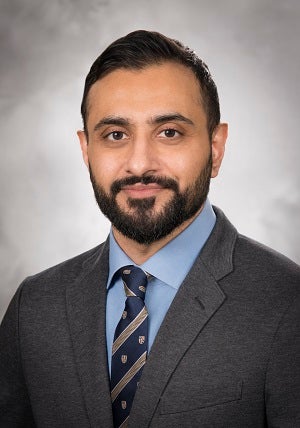Local Neurologist Discusses Common Stroke Symptoms, Importance of Receiving Treatment Quickly
May 12, 2024
Categories: Health & Wellness, Neurosciences (Brain Spine, Nerves)
Omran Kaskar, DO, is a board-certified neurologist with Trinity Health IHA Medical Group. With May being Stroke Awareness Month, Dr. Kaskar discusses the common signs and symptoms of a stroke, how important it is for a stroke to be treated quickly, and more.
Q: Fundamentally speaking, what is a stroke, and what are some common risk factors?
Dr. Kaskar: There are two types of strokes that people commonly suffer from – an ischemic stroke and a hemorrhagic stroke. An ischemic stroke is when a blood clot blocks the flow of blood and other nutrients to the brain, while a hemorrhagic stroke is when a blood vessel bursts inside the brain, thus preventing blood and nutrients from reaching areas of the brain.
Some of the most common risk factors for stroke include having a family history of stroke, having high cholesterol, high blood pressure and/or blood sugar, and using tobacco or vapes, just to name a handful.
Q: What are some common signs and symptoms of a stroke?
Dr. Kaskar: Regardless of the specific type of stroke you have, brain cells immediately start begin dying, which can lead to common disabilities associated with a stroke. I often like to point to the acronym “B.E.F.A.S.T.”, which stands for Balance, Eyes, Face drooping, Arm weakness, Speech difficulty, and Time to call 9-1-1, which provides you the most common signs of a stroke, as well as the most appropriate action to take.
Other common symptoms include numbness in the arm, leg or face, confusion, and a bad headache.
Q: How important is it for a stroke to be treated quickly?
Dr. Kaskar: A stroke is a life-threatening medical emergency. The more time that passes without treatment, the more brains cells that die and the more likely it is to suffer serious long-term disabilities.
Be sure to remember the “T” in “F.A.S.T” – Time to call 9-1-1. Doing this allows paramedics to begin treatment on you while you are still on the way to the hospital. They can also ensure you get transported to the best hospital possible for your specific needs, while also alerting the hospital that you are on the way, which gives the health care professionals at the hospital time to prepare for your arrival so that they can immediately begin life-saving intervention.
Simply put – time is brain. Every second matters.
Q: Is there anything else you’d like patients to know?
Dr. Kaskar: I just would like to reiterate how important it is to act immediately if you or a loved one suffer a stroke. Calling 9-1-1 is critically important, as trained medical professionals will be able to transport you to the very best place possible for your respective health care needs. Calling 9-1-1 and receiving an EMS transport to the hospital will ensure the best results for your health outcome.
To learn more about strokes, please visit trinityhealthmichigan.org.




